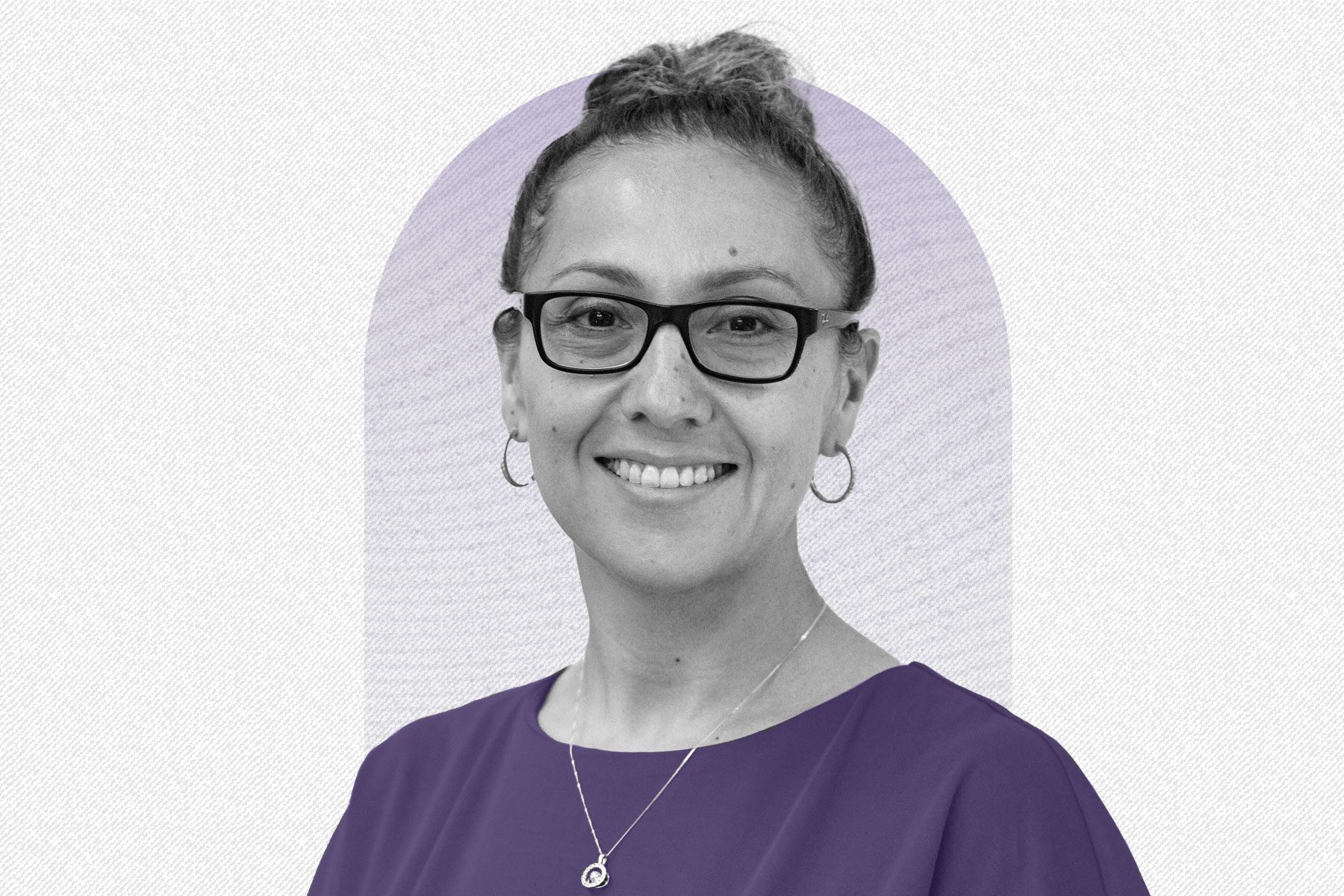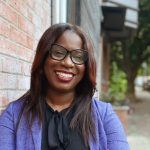We’re telling the untold stories of women, women of color and LGBTQ+ people. Subscribe to our daily newsletter.
Middle school principal Raquel Martinez can relate to the farmworker families in her Pasco, Washington, community because she came from one herself.
Principal of Isaac Stevens Middle School, Martinez is the first Latina to be elected president of the National Association of Secondary School Principals’ Board of Directors in the organization’s 107-year history.
The NASSP advocates for school and student leaders at the school district level all the way to Capitol Hill, and recognizes school leaders with its Principal of the Year and Assistant Principal of the Year programs, National Honor Society Scholarship, among others.
It also represents middle and high school principals, assistant principals, and aspiring administrators in the United States and in over 45 other countries, as well as founding and running the National Honor Society, National Junior Honor Society, National Elementary Honor Society and National Student Council. Collectively, the organization counts more than 15,000 school leaders, 30,000 advisers, and 1 million students as active in its programs.
A 17-year education veteran of Mexican-American heritage, Martinez has worked as an administrator, biology teacher and bilingual facilitator. As a member of the NASSP board of directors, she has served in various roles, most recently as chair of the governance committee to oversee efforts to improve board policies for members. The 40-year-old grew up about 90 minutes away from the community in which she now works, giving her an intimate understanding of the challenges her students and their families face — from language barriers to grueling work in the fields.
“Raquel is a visionary and collaborative leader with a proven track record of developing those same qualities in others,” said NASSP CEO Ronn Nozoe in a statement. “We know she has the experience, character and passion needed to advocate for an equitable system that works for all students and educators.”
Announced as the president-elect on January 30, Martinez will begin her tenure as NASSP’s leader next year. The 19th spoke with her about the significance of being the first Latina president of the long-running group, her goals for the organization, and the many challenges principals face amid the pandemic and a divisive political climate. She also discussed the impact she made on students as a woman biology teacher and how growing up the daughter of farmworkers allows her to connect with school stakeholders in a community where 55 percent of the population is Hispanic or Latinx.
This interview has been edited for length and clarity.
Nadra Nittle: What does it mean to you to have made history as the first Latina president of the NASSP?
Raquel Martinez: What it means is that I’m seeing the effect on my students. I had a student come in, and he’s like, “You didn’t tell us that you’re sitting on this board and that you were doing this! The word has spread. We’re Latinos, too!” They’re sending me emails, and it fills my bucket for them to look up to me like that, that I can be an example. It lets them know that they can also do the same thing. A student I’ve been working with told me the other day, “Remember when you told me I should be a teacher? Now I’m really taking you seriously. I should be a teacher!” If I can influence our Latino, Latina students to feel empowered and show them that they can also excel and be in leadership roles and have a voice, you know, why not? I’ll do that all day.
And I just relate to our parents, families at the school so much. Many times they’re like, “You’re la directora, you’re the principal? You’re young and you speak Spanish? You’re Hispanic?” And I’m like, “Yes, I am.” My background helps our families to connect with our school.
You’re not only a Latina administrator but also the daughter of farmworkers. Can you describe the journey you took to get to where you are now?
The struggle is real. I grew up in poverty with my parents working 12 to 14 hours a day outside. I worked in the fields as well. That’s really hard work, calluses on my fingers, on my knees. I remember my dad would work in the onion fields. He’d come home and his neck would be beet red, like a burgundy red. My parents would come home covered with all kinds of stuff [to protect them from the elements], like hats, scarves, all these things, and I would just see how hard they worked for the little things that they were able to provide for us.
So, I’m much more appreciative of the things that I have, and I can relate to our school families, to the community, when I’m talking to them, to our students. I meet our [farmworker] families where they’re at. I’ve had parents drop in like, “Hey, it was raining so I didn’t have to go to work today. Can we meet today at this time?” Absolutely, I will accommodate them. It’s a special part of my heart because, like, it hurts when I see and I hear the stories from our families and what they’re going through to help their children. They entrust me with their children and their learning, and I do not take that for granted while they’re out working in those fields.
What made you want to become an educator?
I was pre-med at first and, then, to be honest, my younger brother had gone through a difficult time in middle school, high school, and while I was in college, I would hear how his interactions with adults were very different than the interactions that I had. I had teachers who invested time into my learning, who cared and motivated me, saying, “Hey, you’re really good at science.’” Others encouraged me to continue to do well in school. There was just a lot of mentoring happening along the way. But to better answer your question, when my brother continued to make poor choices and also just didn’t have a relationship with any adults at the school, I knew he could become who he is now — he did end up going to college — and his experience pretty much shaped me. I was like, “I can’t do pre-med; I need to go into teaching.” So I switched my major to biology teaching.
Being a woman of color and a biology instructor, what kind of impact do you think you made on students? Women are still underrepresented in STEM professions, and research indicates that starting in the middle grades, many girls start to lose confidence in their math and science abilities.
Oh my gosh, I loved teaching biology. Some of my former students are in college, and they’re able to see that science doesn’t have to be boring. It can be awesome! A couple of my former students have become teachers and work in my building. One of them is a science teacher. She’s great. It is so motivating for students to learn science from women.
I just tried to be available and be present with my students. I want them to be able to see that they can do this too. They can do hard things if they like and have an interest in them. That’s why I got into it. I didn’t have a science teacher that was female. Mine was male in high school, and he was awesome. He wore rollerblades around the high school to make things fun. So why not make it fun, and I like to believe that I did.
You’re going to be heading up the NASSP during a time when principals are under a great deal of stress due to the COVID-19 pandemic, staffing shortages, and laws that limit what schools can teach. What are your thoughts on what the climate is like for principals now?
I’m a firm believer that it’s not about being a principal by yourself anymore. It’s about who you surround yourself with. It’s about what’s going to fill your bucket. There’s so many things happening around us, and a lot of it we can’t control. So, I think a lot of it just has to do with self-care. It’s hard to practice self-care when you’re carrying the burden of trying to recover from COVID or the learning gap the pandemic has created for kids. So, I get it.
Some principals that I knew are no longer principals. There’s so much pressure to get our kids to where they need to get to with their learning, and you have to be able to have a balance. You have to have the right people around you. You have to have the right support from your superintendent and different people at the district office. You all have to be working in one direction and have a common vision, and if you don’t have that kind of support, that’s another big reason why principals leave. When I talk to fellow principals, I know it’s not an easy job by any means. It’s not something that we take lightly. It’s something that if we’re doing this, it’s because our heart is in it and we’re gonna go 100 percent to impact students’ lives.
What are your goals as NASSP president? What do you hope your impact is?
My plans are not 100 percent solid, but I would say, you know, how many times do we actually get to talk about and celebrate student growth versus proficiency? How many times do we get to celebrate our Title I schools, or schools that are nearly 100 percent free and reduced lunch, and the growth that they are making and that our kids are making? How many times do we get to celebrate that our students are bilingual? They’re not just learning a second language. They’re actually bilingual, and we’re teaching them to be biliterate. How many times do we bring that to the forefront and value learning a second language and also value students’ first language? So, my hope is to bring light to that.
And I’d love to be able to have conversations with people in the same business that I’m in, who have the same struggles and to share with them. I feel like we’re doing great work. Just because our kids aren’t there yet doesn’t mean that they’re not making more than one year’s growth. So, that’s kind of where my thinking is right now in this initial phase. As I continue to speak with others, that might shift a little bit but that’s where my heart is at.






